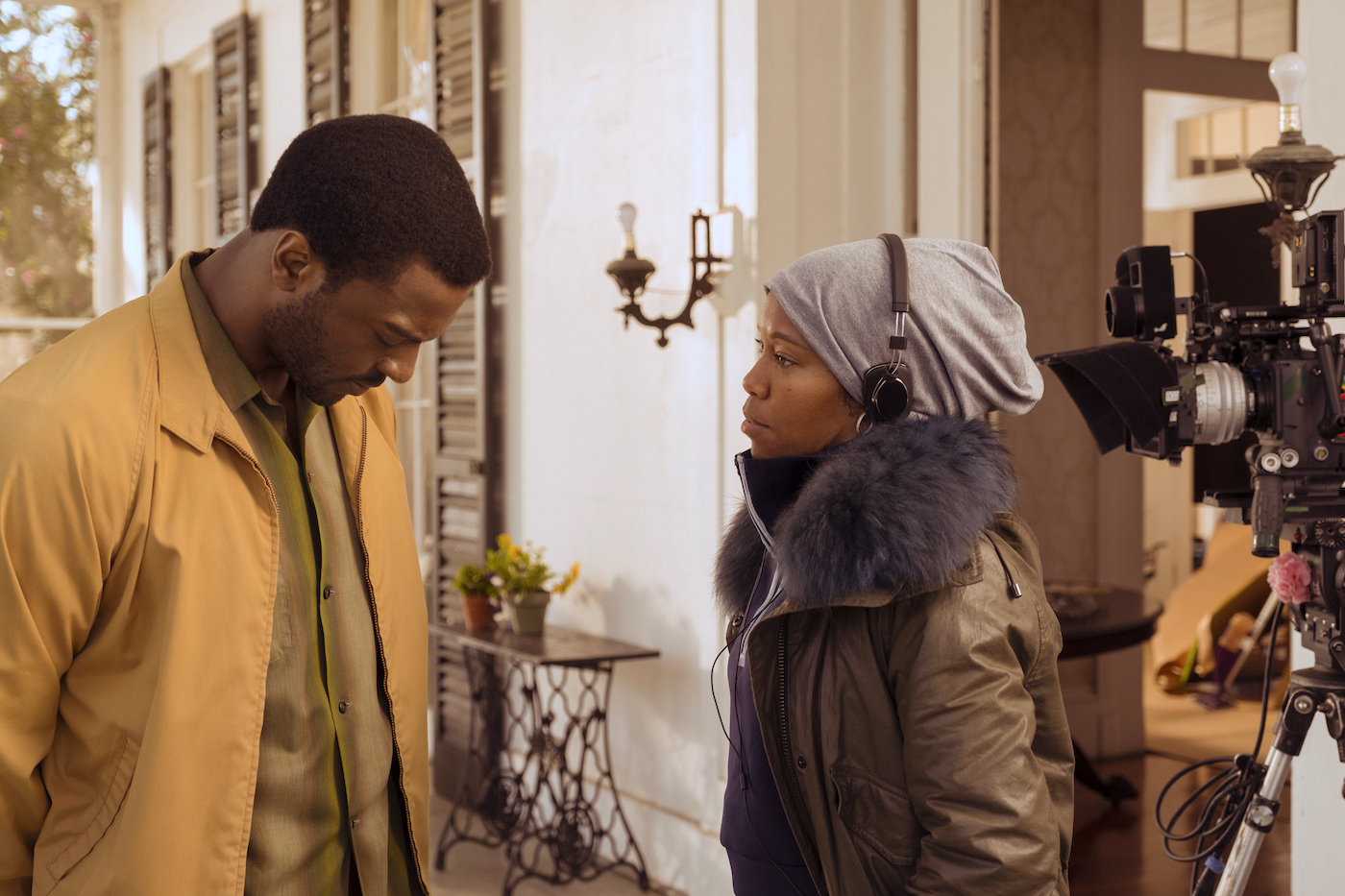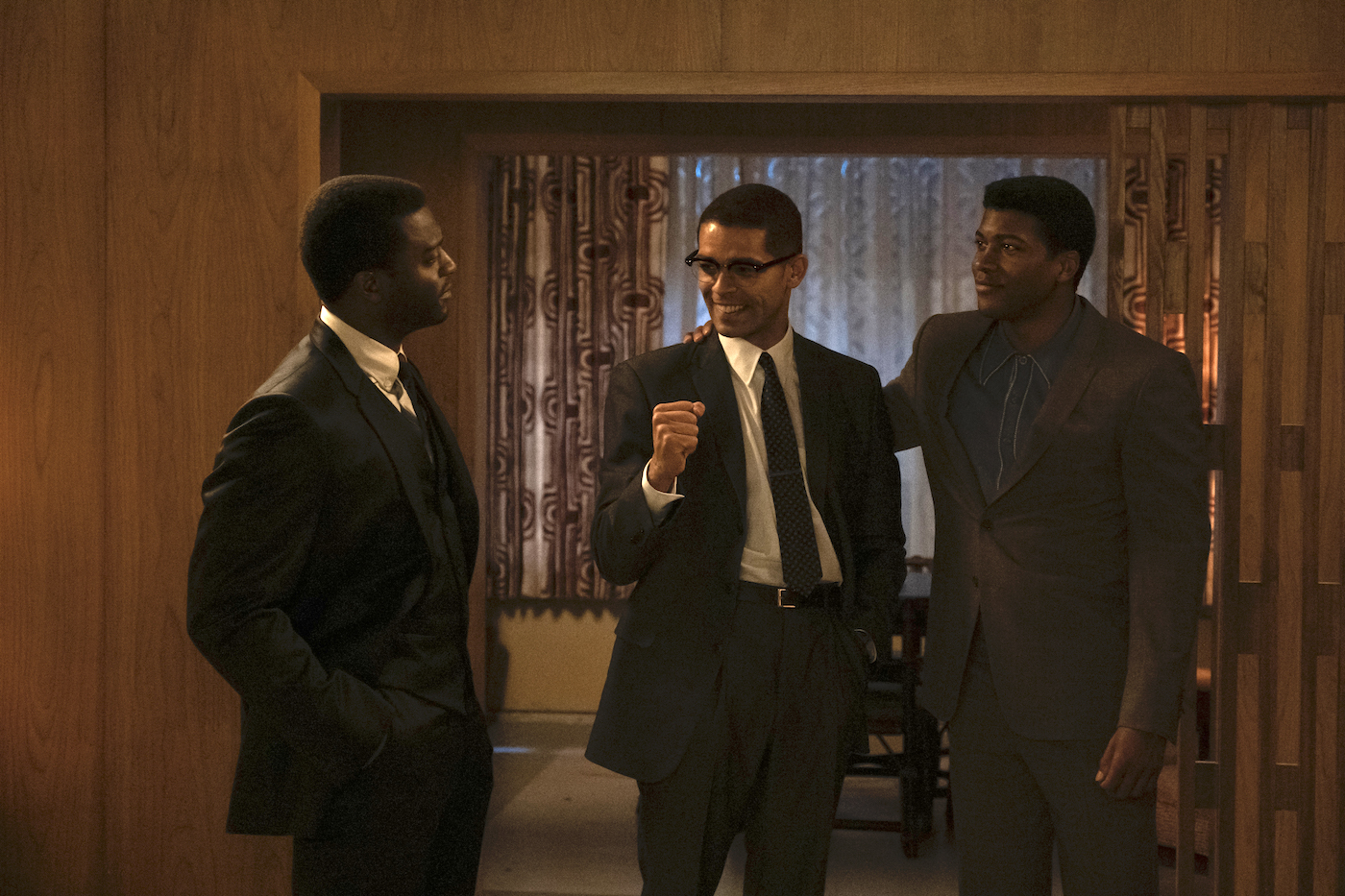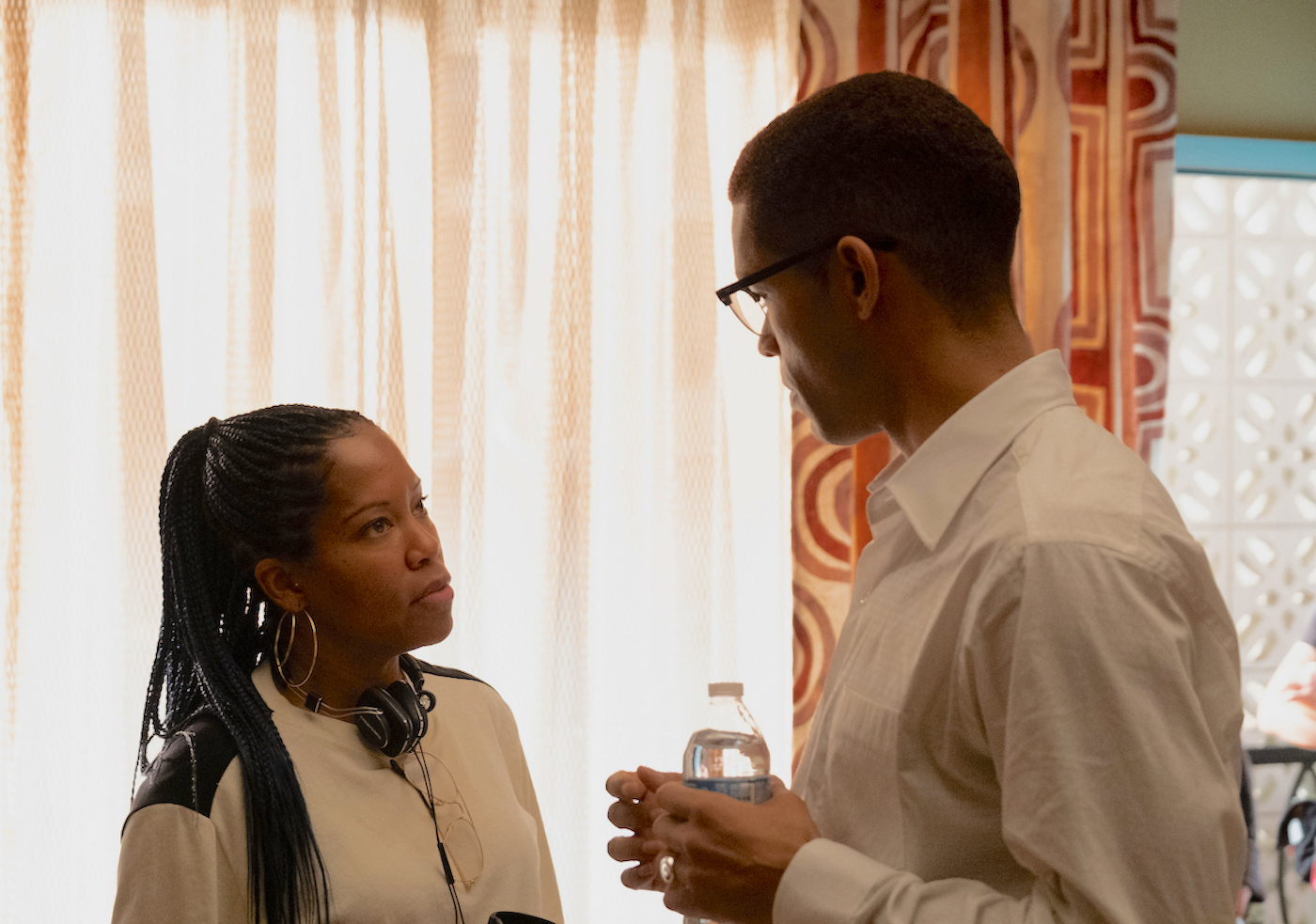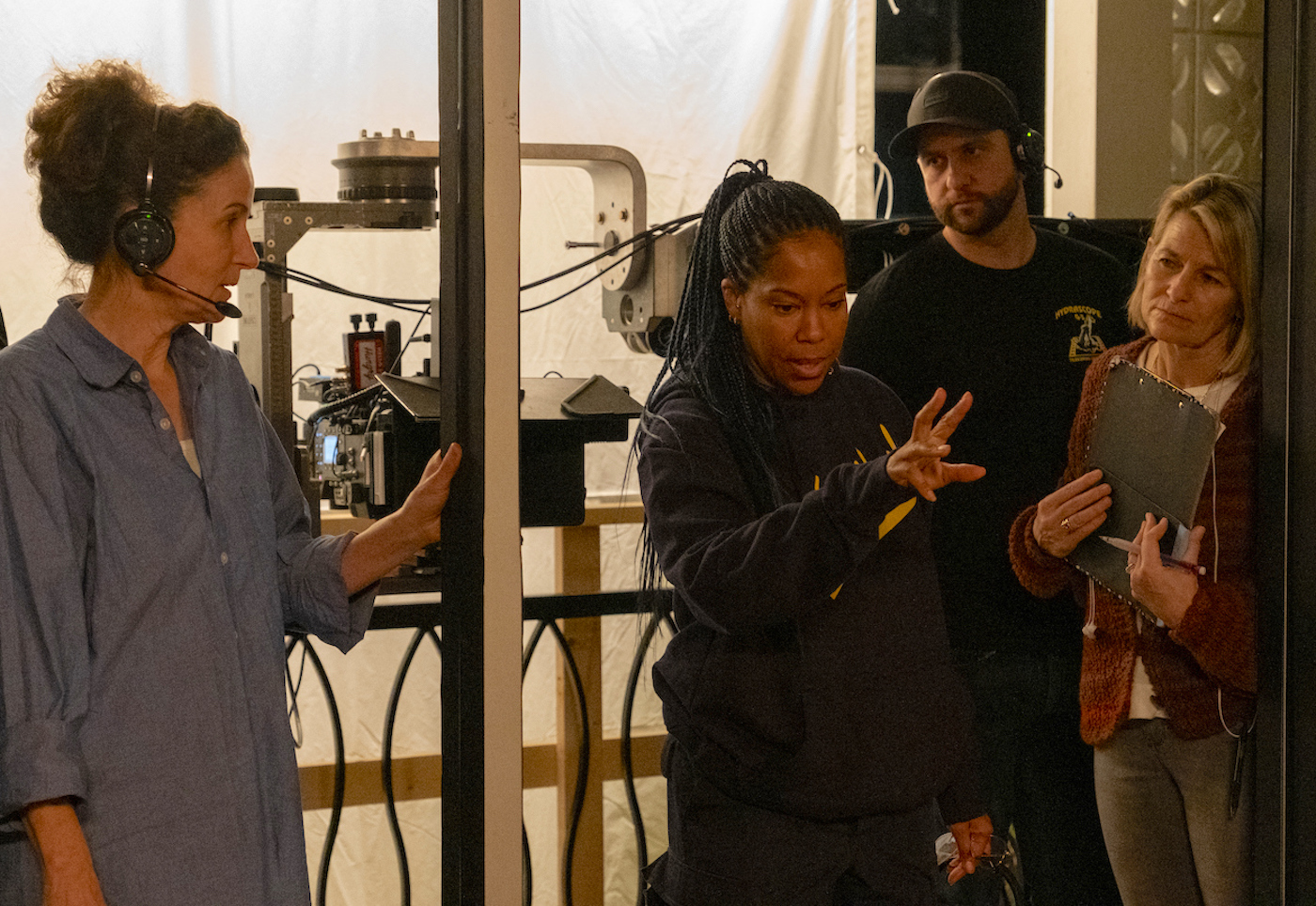One business breakfast – back when we could still have those – Regina King met with ICM Partners’ Harley Copen: “He asked me very pointed questions about the types of stories that I wanted to tell,” recounts King now (via Zoom, of course.)
King served up different ideas to Copen, including a love story with a historical backdrop. By way of example, she began naming films in that genre, which were, unsurprisingly, told from a white perspective. “I don’t think you see that many [historical love] stories being told from a Black perspective in cinema,” King describes. “In a lot of ways, One Night in Miami for me is a love letter to the black man’s experience. When Harley emailed me the script, I felt like he had fulfilled [my request].”
Of course, King has been directing television for some eight years now: Emmy-winning and Emmy-nominated shows such as Being Mary Jane, Scandal, Insecure, and This Is Us; the TV movie Let the Church Say Amen and the more recent The Finest. King, who began her acting career at 14 years old playing Brenda Jenkins on the NBC sitcom 227, has won a slew of acting awards herself over the last three decades, including four Primetime Emmys, a Golden Globe, and an Oscar for Best Supporting Actress. The latter two were for If Beale Street Could Talk. Hot off her lead role in HBO’s genre-bending and award-winning Watchmen, King’s feature directorial debut, Amazon Studios’ One Night in Miami…, releases amidst nationwide calls for racial equity in all areas of society. I talked to King about owning up to mistakes, how the industry continues to incrementally expand its representation, and why she chose One Night in Miami… to be her first feature film.
ICG: You’ve said that Marla Gibbs was the first boss lady that you saw up close. Did that impact your career choices? Regina King: Oftentimes, in life, you’re learning by example, but you don’t even realize that until after the fact; it’s that “hindsight is 20/20” saying. I was in the close company of a woman who was accomplishing things that we talk about now and applaud. I was in the stage play version of 227 that Marla put on at her performing arts theater that she owned, [acting in the lead role], and then I saw her sell it to NBC and become the executive producer, where she fought for things to be a certain way. Today, many women are making those types of projects, and there are so many examples, but not in 1984. And while I wasn’t sitting there taking notes, it had a big impact on me from a very young age.
Who else has influenced your career? My mother is a teacher, which I think is a very powerful job, but it’s just not lauded as a heroic occupation. As an adult, I’ve come to realize how much of an impact teachers have in everyone’s lives. And I could name other women – and men – all day who’ve influenced me: John Singleton, Paris Barclay, Christopher Chulack, Debbie Allen, Shonda Rhimes, to name a few. Like many people who have had success, there’s a whole list of people who have been influential in some way or another. After I did Boyz in the Hood with John [Singleton], and I auditioned for and got the role in Poetic Justice, I didn’t realize that directing was going to be part of my career trajectory. But it was John who opened me up to understand what a director does beyond just the relationship with an actor.
Is directing more fulfilling than acting, or vice versa? I can’t say it is more fulfilling. While they are both absolutely connected, they’re just very different. Directing allows me to have a little more agency with whatever the project is. As a director, I do get the opportunity to work with more people that have to do with the storytelling process – the cinematographer, the production designer, wardrobe, producers. It gives the opportunity to have in-depth creative sessions and discoveries with more than just your castmates, director, or wardrobe designer, which I kind of feel for an actor is the extent.

What did you learn from directing television about crewing up? Directing TV taught me a lot. It was kind of the point, actually – doing all that TV before directing this film. I used it like my school, and I’m very thankful for people like Shonda and Mara Brock Akil who gave me those first opportunities to go to school, if you will. Once I realized that I wanted to be a director, Chris [Chulack] and Paris [Barclay] helped point me in the direction I needed to go. I shadowed both to see what a director has to do beyond working with the actors. As for crewing up, I learned that communication is paramount. A good communicator for me is a person that one: doesn’t yell, and two: takes the information and can distill it so we can have a shorthand, because time is never your friend. When you’re able to identify crew members who are great communicators, or your communication styles are compatible, it makes for solution-based thinking. I don’t care how much you prepare; you’re going to run into something where you have to come up with a solution quickly.
Despite its period setting, One Night in Miami echoes current racial equity issues. Was that something that drew you in? Absolutely. That made it even more powerful when I first read it. It’s not like these conversations haven’t been going on, whether it’s 1950, 1960, 1990, or 2020. I read somewhere that someone said they felt like our film was trying to point a finger, weighted too heavily toward current events. And I was like, “Wow, that clearly is a person who probably isn’t Black.” [Laughs.] We are all guilty of being in our own bubble. I don’t know you and I don’t know what you’ve gone through; it has no bearing on me, but this is an American story. And that person clearly has no connection to experiences other than their own, and the American histories they’ve been fed.
Black storytellers are more visible in Hollywood than ever before, but not black faces – especially behind the lens. How does that change? A lot of pressure lands on those of us getting the opportunities now. If we are successful, it creates more opportunities for others. It’s unfortunate it has to be that way – that how a Shaka King or a Gina Prince-Bythewood does determine if Black crews are going to be given an opportunity. It’s not fair, but that is what history has shown. I do feel that articles and conversations like this one are helpful. When journalists and outlets decide to report on the subject matter, it keeps the spotlight on the fact that there are so many talented people out there that are not getting an opportunity, and for no legitimate reason.
With #OscarsSoWhite and the social justice issues from this past summer, do you think Black representation will continue to change this industry? I think it has to. I do hear often from [other people of color], who say that they hear these conversations about Black and white, but what about them? I feel that this is opening up the conversation for them to take the charge and for us to do it together. But the reality is, there is a storied history between Black and White people of America. And so much of that history has been revised. Because of that, we have to fight for Black people. It’s not that we’re saying we don’t care about Latinos, or Asians, or Native Americans, or anyone else in this country who isn’t white. It’s just a very specific story on how America was created that has to do with the history of how Black people came here, how they built the country, how Black bodies died and were erased so that the country can be what it is. That makes it a very sensitive topic. But I do feel like we are making moves that aren’t lateral – moves that are going to change systems, which will benefit all [people of color.]

A few years ago at the Golden Globes, you pledged that everything you produced from then on would be at least 50 percent women. Have you been able to hold that promise? It’s been hard. And no, I have not been able to hold that promise. I knew that it was going to be tough, and the lesson I learned from that is: “Do and then say later!” [Laughs.] But what’s done is done. It won’t stop me from trying to continue to achieve that.
Why haven’t you been able to hire at least 50 percent women? We are in this space now where so much is in production, and that’s a wonderful thing. But that also means there aren’t as many [female crews] available to go around. In some cases, when I had hired women for a specific position, whether it was scheduling or whatever, they weren’t able to remain on. And with an indie film [like One Night in Miami], you don’t have as much latitude, money, or time. Some people who may have been available budget-wise, we couldn’t afford to fly them in and put them up. I also had to hire crew in New Orleans for the tax incentive and budget, so many factors come into play. Some will say that is the reason why what I said was such a naïve statement. That’s fine. I’ll accept that. But it’s not going to stop me from continuing to try and reach those goals. What I was able to do on this film was meet and beat a diversity number. I have to give myself some grace for the fact that more than 50 percent of our crew were not white cisgender males.
Even before COVID-19, features were trailing small-screen content in many ways. What do you think the future holds for the theatrical experience? I love going to the movie theater. I like the whole experience – the sound, the big screen, the popcorn and candy! In the past ten years or so, we had the dinner-at-the-movies experience, and oh my god, that’s an experience. And I do realize that when I bring that up, there are people out there who are like, “Well shit, I can’t spend an extra 30-something dollars just to go to the movie theater,” but I do surely appreciate that new trend. I know that the theaters are struggling, and I don’t want going to the movies to ever end. My hope is that perhaps we adapt as human beings. Like what Amazon is doing with the One Night in Miami – it’s going to have a small theatrical release in the places that will hopefully be open in December, and then streaming after that. Maybe as an industry, we’re going to start to work more with that type of model. But no one really knows.

by Valentina Valentini / Photos by Patti Perret
